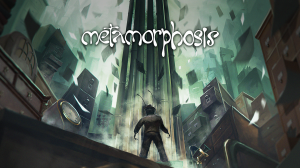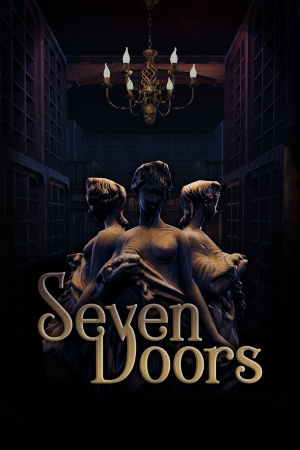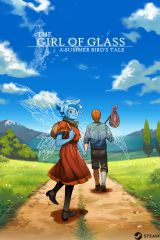Review for Paradise Killer
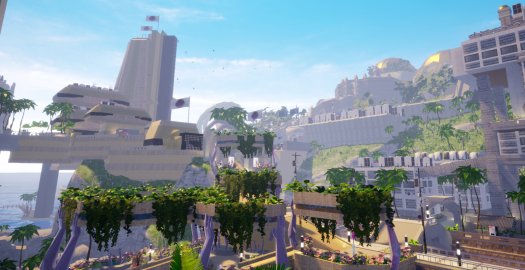
In talking about Paradise Killer, it is easy to get caught up in the details of its wildly imaginative world and its story of regenerating islands, dead alien gods, and a gruesome mass murder. Within this surreal, fantastical backdrop, however, is something even more impressive: a rock-solid detective game with vibrant art, clever writing, and one of the best examples of open-world investigative gameplay I’ve seen.
Paradise Killer provides a lot of strange, fascinating plot points and world-building elements right up front, beginning with your character. You are “investigation freak” Lady Love Dies, currently three million days into what was supposed to be eternal exile after being deceived by one of the old gods (a criminal offense in this world), but now released to solve the mass murder of Paradise Island’s ruling council. After being called in by the Syndicate, a coalition (of which you were once a part) of individuals dedicated to the worship of alien gods, you jump off the edge of your floating, solitary room and freefall down to Paradise Island.
The game doesn’t bother with too much background exposition, and that initially feels like a curse. You’ll be having conversations with fellow Syndicate members about demons that have destroyed previous iterations of the island (the murder takes place in the 24th iteration of Paradise), and it’s completely disorienting as a new player. With time, though, that early lack of concrete information allows you to piece together this world’s history through dialogue, environmental clues, and various items you find scattered around. Once the picture began to get clearer, I was fully immersed in this unusual world and felt like I had a fairly solid grasp on what came before. Even if it’s hard to make sense of at times, the lore here has an internal logic that explores some interesting ideas.
The lack of hand-holding is all part of Paradise Killer’s wonderfully free-form approach to investigative gameplay. There are no quest markers, the island is vast and open, and the killer could quite literally be any of the characters you meet. Your job is to investigate—not in the guided sense we’re used to in video games, but in a much more personal way. You’re left to decide for yourself how best to gather clues and alibis, cross-reference the stories given by various characters to see if they match up, and come to your own conclusions. There really isn’t an obvious suspect, as each character has a motive and the means to have committed the crime. The game expects you to think about what it all means to you, and it doesn’t push you towards any final deduction.
That’s not to say that you’re completely without assistance, as you’re given an AI-powered device called Starlight to keep track of your evidence and suspects. Clues are sorted by the character involved and general topic, though you may find some that aren’t yet connected to a particular suspect or a situation you’ve learned about. Such clues are temporarily clumped together, unsorted, until you discover the info that provides the proper context. In keeping with its hands-off approach, however, the game doesn’t give you any hints as to where you’ll find the pieces of the puzzle that will connect things together; that’s on you.
While Paradise Killer is happy to leave you to your own devices most of the time, it’s not so aimless as to be frustrating. You can hit a key to bring up an augmented reality mode that will show you where other characters are located. There is also a map that gives you a general idea of where things are, and there is a staticky sound that grows louder as you near collectible objects and pieces of evidence. If you find yourself totally lost, your best bet is to just find the nearest character and start chatting with them. You’ll almost always have an alibi to corroborate, a new clue to grill someone about, or new information about Paradise Island that needs further detail.
Navigation is done via standard 3D first-person controls: WASD keys to move, mouse to look around, spacebar to jump, shift key to run. You’ll gain abilities like double-jump as you play, and while I wouldn’t call this game a platformer of any sort, there is some dexterity required as you move around and (especially) find hidden areas. There’s no way to die, so you can feel free to leap off the edges of cliffs and rooftops to reach new areas.
Other than evidence and the optional collectibles you can find (called relics, which offer more information about the world and its characters), you’ll also collect Blood Crystals, the currency of Paradise Island that are scattered liberally around. These crystals can be used to buy upgrades for Starlight (from purely cosmetic changes to important updates that allow you to access new areas) and clues from the ram-headed information broker Crimson Acid. The information she sells is not always necessary to solve the mystery, but certain secrets can help you make connections between events, as well as provide additional insight into each suspect’s motivation.
You’ll spend most of your time exploring and talking to suspects, but you’ll also encounter some puzzle-solving sequences to break things up. There are terminals around the island that you’ll interact with to unlock doors, which require you to match pieces of a silhouette to complete an image. Some of these terminals will be inaccessible until after you’ve upgraded your Starlight device to a certain extent, though the puzzles themselves are never very challenging. There are also some light environmental obstacles to overcome, but they’re infrequent and also not terribly difficult.
The main puzzle to solve here is the murder mystery itself. As you question people about their motives and alibis, and ask them to corroborate the stories told by their fellow residents, you’ll pick up new clues that will be added to Starlight. Additionally, you can sometimes choose to “hang out” with any of the cast members. Doing so enough times will give you the option to “probe” them for further information, and you’ll often get some important clues this way.
There’s a lot of talking in this game, but the smart, engaging, often funny writing brings each member of its eccentric cast to life. During conversation, character overlays appear as distinctive anime-inspired, visual novel-styled 2D cutouts against the otherwise fully 3D world (reminiscent of the Danganronpa series). Bold colors and over-the-top outfits set each individual apart, making them recognizable even from a distance and hard to forget. We have the suave, perpetually open-shirted Doctor Doom Jazz, with whom Lady Love Dies has some obvious chemistry; the married assassin couple Lydia and Sam Day Break; the snarky minor demon Shinji, who pops up to chat as you explore the island; and the fanatical masked man known as The Witness to the End—just to name a few. It’s a fascinating, diverse cast with well-written personalities to match.
The Syndicate members you’ll meet are also interesting in their own right. Some are charming and likeable, others unpleasant but entertaining nonetheless, though to split them into categories of “good” and “bad” would be inaccurate, as the island’s regular citizens are regularly sacrificed to the dead alien gods by the Syndicate members. This adds a welcome layer of complexity, as even you can’t really be called a “good” character. It’s not unimaginable to think of any one of the suspects committing the crime.
Paradise Island itself is a bright vaporwave-influenced environment—a beautiful playground existing somewhere in between the real and unreal that you can freely explore. The world is large and varied, and though there are occasional detours (a sewer system, an eerie alternate world I’m not even sure I could describe), most of your time will be spent outdoors, including the majority of your conversations. The environment is a blend of scenic vistas, Japanese-styled suburban neighborhoods, beaches, and towering cityscapes, ranging from island retreat to developed metropolis. Along the way you’ll see realistically rendered water and beaches alongside goat-headed people and large statues of arms reaching from the earth, and it really is fun to traipse around the island.
The synth-heavy soundtrack is a perfect match for the almost dreamlike mood and visuals here, and I can imagine myself listening to the score even outside of the game. There’s some voice acting, but it’s a mixed bag. First of all, it’s only for occasional lines. Sometimes random words are spoken during dialogue, but I found it jarring when the emotion behind the spoken line failed to match the tone of the written text being displayed. Additionally, the acting itself is hit-or-miss. Some characters sound good and appropriate for their appearance and personality, but others seem amateurish and (again) mismatched. There’s an option to reduce the frequency of the spoken lines, or even turn them off altogether, and I ended up playing with voices at the second-lowest frequency. It doesn’t ruin the experience, but it’s a noticeable flaw in such an otherwise impressive production.
As for the central mystery, it does have a satisfying singular ending. While this may seem at odds with what I’ve said of its open-ended nature, the important element here is that you need to do the work to figure out the whole story. The ultimate answer to whodunnit is consistent across playthroughs, but there are so many motives, relationships, and clues you’ll need to discover in order to really understand the entire mystery. It took me a solid fourteen hours to come to my own conclusion, as the game is more interested in the how and why than just a definitive answer of who the killer is—and perhaps there’s more than just a mass murder to investigate.
It should go without saying that the free-form style of gameplay won’t appeal to every player—and neither will the surreal, complex world of alien god worshippers, human sacrifices, and the questionable morality of even the “good” characters. Personally, I found the atmosphere, gameplay, and narrative to be terrific. It all feels appropriately unpredictable, but there’s never a lack of thoughtful design that has gone into making each of these elements work effectively in tandem. As good as all this is, though, Paradise Killer excels further in matching its surreal premise with inventive investigative gameplay. It’s rare to find a truly great detective game that actually captures the feeling of piecing together a mystery and giving you the freedom to go about it however you like. You may feel lost in the first hour or so, but it’s absolutely worth sticking with the game to find the ways its plot elements ultimately connect.
WHERE CAN I DOWNLOAD Paradise Killer
Paradise Killer is available at:
- GOG -60%
- Steam
- HumbleBundle


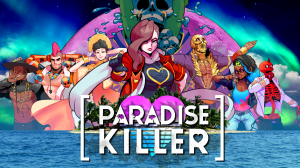
_capsule_fog__medium.png)








